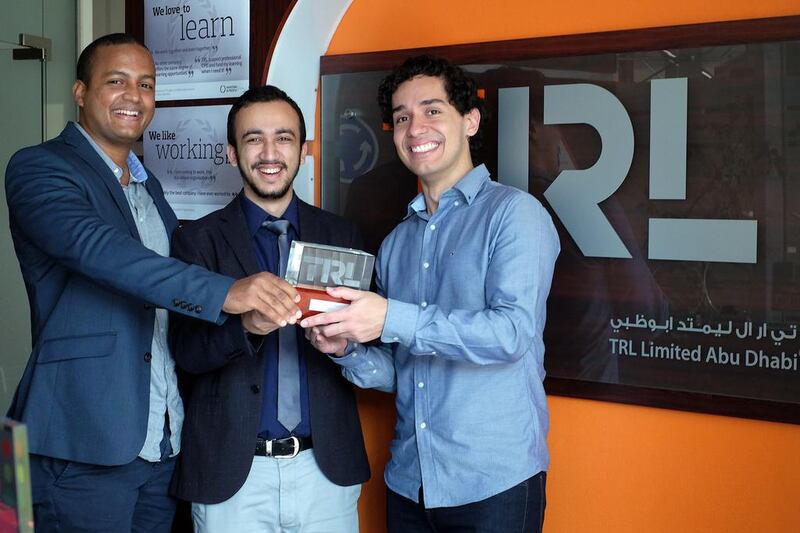Masdar Institute students’ blueprint for an integrated rapid transit system features choice of express or normal services to suit every pocket, and online ticketing and route planning to keep bookings simple.
ABU DHABI // Imagine hopping on to a city bus knowing it will make fewer stops to your destination, and remove the stress from your morning travel.
Or how about being able to plan the entire journey using a mobile app, including buying the tickets and reserving seats.
Three master’s students at Masdar Institute of Science and Technology hope to make these improvements in public transport a reality, so that travelling by bus in Abu Dhabi is more attractive and sustainable for all.
Their project, called Bus-Oriented Development, imagines an Abu Dhabi bus rapid transit system (BRT) where buses run in partly or fully dedicated lanes.
Allan Pimenta, 24, of the institute’s sustainable critical infrastructure programme, said BRT systems were cheaper and quicker to build compared to rail systems.
“In my country, Brazil, we have a BRT system but in the GCC it has never been used,” he said. “Our priority is not only the BRT but a mobile app that will promote walkability.”
The app, which aims to improve walking near BRT stations, will count the number of steps taken by a person within a period of time before they buy a prepaid electronic bus ticket.
The app will generate a QR code to give the passenger a fare discount coupon proportional to the number of steps they have taken.
Engineering systems and management student Jean Phelippe de Oliveira said they were also looking at enhancing the Darb mobile application from the Department of Municipal Affairs and Transport.
“By integrating the app with the Darb, we’ll be able to encourage people to use public transport,” said Mr de Oliveira, 24.
“Imagine checking traffic updates inside your car, with the same application offering you the possibility of taking the bus to make your journey faster. And at a certain time of the day, you may even get a discounted fare.”
The students also looked at ways that public transport could better address the different needs of low, middle and high-income earners. Local buses would target low-income earners with cheaper fares, while for middle-income commuters, rapid buses with higher fares would skip some stations to speed up journeys.
The express system would target tourists and high-income earners who generally are less confident about public transport. Express buses will stop at a few major stations near commercial centres, affluent residential neighbourhoods and tourist attractions.
First-class buses would offer more comfort, with toilets and entertainment, while passengers would also be able to reserve seats in regular buses by buying tickets online. Asim Khanal, 25, who is also taking a master’s in sustainable critical infrastructure, said the development concept could help to create vibrant, liveable and sustainable communities.
“Each station will serve as a hub similar to the concept at the Al Ghubaiba bus station and the Union metro station in Dubai,” Mr Khanal said.
“A transit-oriented development is designed to maximise access to public transport. We design pathways, not overhead bridges, for pedestrians from nearby areas to get connected.”
The bus plan is aimed at increasing demand for the Abu Dhabi metro project – part of the Abu Dhabi Vision 2030 blueprint – and integrating the city’s public transport system with public-private partnerships.
“One of the main points is to make it viable and generate revenue as soon as possible to build the system,” Mr de Oliveira said.
“That’s why we’ve proposed a marketing strategy to attract more investment to the project, with advertisements and naming rights.”
The team, which started work on the proposal in September, won the Transport Research Laboratory Student Award this month.
Dr Britta Lang, who leads TRL in the UAE, said the Masdar Institute students came up with a holistic, comprehensive and well-researched proposal for sustainable traffic solutions. “They really produced a nice piece of academic research, where they thought about specific situations of Abu Dhabi – the population, the composition of the population, the transport needs of the different segments and how they can respond to that,” Dr Lang said.
“What was so outstanding about it is that, after identifying the transport solutions around the world and the needs of Abu Dhabi, they had innovations such as mobile apps that encourage not only transport use but also walking, with diversified offerings in terms of types of buses.”
rruiz@thenational.ae






